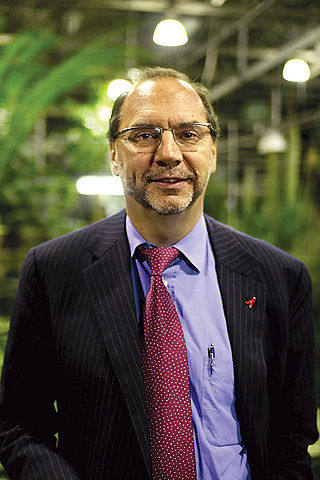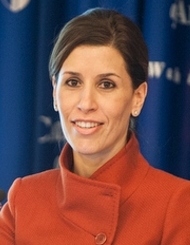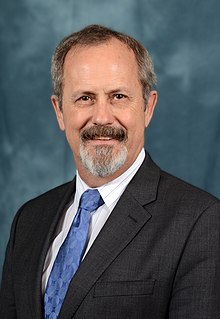
In medicine, triage is a process by which care providers such as medical professionals and those with first aid knowledge determine the order of priority for providing treatment to injured individuals and/or inform the rationing of limited supplies so that they go to those who can most benefit from it. Triage is usually relied upon when there are more injured individuals than available care providers, or when there are more injured individuals than supplies to treat them.

Sir Peter Karel, Baron Piot, is a Belgian-British microbiologist known for his research into Ebola and AIDS.

Disaster response refers to the actions taken directly before, during or in the immediate aftermath of a disaster. The objective is to save lives, ensure health and safety and to meet the subsistence needs of the people affected. This includes warning/evacuation, search and rescue, providing immediate assistance, assessing damage, continuing assistance and the immediate restoration or construction of infrastructure. The aim of emergency response is to provide immediate assistance to maintain life, improve health and support the morale of the affected population. Such assistance may range from providing specific but limited aid, such as assisting refugees with transport, temporary shelter, and food to establishing semi-permanent settlements in camps and other locations. It also may involve initial repairs to damage or diversion to infrastructure.

Howard Markel is an American physician and medical historian. At the end of 2023, Markel retired from the University of Michigan Medical School, where he served as the George E. Wantz Distinguished Professor of the History of Medicine and Director of the University's Center for the History of Medicine. He was also a professor of psychiatry, health management and policy, history, and pediatrics and communicable diseases. Markel writes extensively on major topics and figures in the history of medicine and public health.
Mass gathering medicine, also known as event medicine, crowd medicine or mass gathering health, is a field of medicine that explores the health effects/risks of mass gatherings and the strategies that contribute positively to effective health services delivery during these events. The reason for the development of the field of medicine gives the fact that mass gatherings generate a higher incidence of injury and illness, may be the subject to a catastrophic accident or attack with large numbers of injured or dead persons.

Luciana Borio is a Brazilian-American infectious disease physician and public health administrator. She is a vice president at In-Q-Tel. She previously served as director for Medical and Biodefense Preparedness at the National Security Council, acting chief scientist of the U.S. Food and Drug Administration (FDA), assistant commissioner for counterterrorism policy of the FDA, and director of FDA's Office of Counterterrorism and Emerging Threats. She is known for her work advancing clinical trials, the development of medical countermeasures for health emergencies, and the public health responses to Ebola and Zika outbreaks.

Raj Panjabi is an American physician, social entrepreneur, professor and former White House official.
Frederick M. "Skip" Burkle, Jr. is an American physician known for his work in human rights, international diplomacy and peacemaking, humanitarian assistance, and disaster response. He has been called "the single most talented and experienced post-conflict health specialist working for the United States government." His medical qualifications include pediatrics, emergency medicine, psychiatry, public health, and tropical medicine.

Gregory R. Ciottone is an American physician specializing in disaster medicine and counter-terrorism medicine. He is an associate professor of emergency medicine at Harvard Medical School and the founding director of the BIDMC Fellowship in Disaster Medicine, the first of its kind in a Harvard teaching hospital. As well, he holds the position of director for medical preparedness at the National Preparedness Leadership Initiative, a joint program of the Harvard T.H.Chan School of Public Health and the Center for Public Leadership at the Harvard John F. Kennedy School of Government. He also serves as a consultant to the White House Medical Unit for the Obama, Trump, and Biden administrations. In 2019 he was elected president of the World Association for Disaster and Emergency Medicine. (WADEM).

Kobi (Jacob) Peleg is an Israeli professor of Emergency and Disaster Management at Tel-Aviv University, and formerly the director of the Israel National Center for Trauma & Emergency Medicine Research at the Gertner Institute for Epidemiology and Health Policy Research.

Syra Madad is an American pathogen preparedness expert and infectious disease epidemiologist. Madad is the Senior Director of the System-wide Special Pathogens Program at NYC Health + Hospitals where she is part of the executive leadership team which oversees New York City's response to the Coronavirus disease 2019 pandemic in the city's 11 public hospitals. She was featured in the Netflix documentary series Pandemic: How to Prevent an Outbreak and the Discovery Channel documentary The Vaccine: Conquering COVID.

Michael Joseph Ryan is an Irish epidemiologist and former trauma surgeon, specialising in infectious disease and public health. He is executive director of the World Health Organization's Health Emergencies Programme, leading the team responsible for the international containment and treatment of COVID-19. Ryan has held leadership positions and has worked on various outbreak response teams in the field to eradicate the spread of diseases including bacillary dysentery, cholera, Crimean–Congo hemorrhagic fever, Ebola, Marburg virus disease, measles, meningitis, relapsing fever, Rift Valley fever, SARS, and Shigellosis.

Caitlin M. Rivers is an American epidemiologist who as Senior Scholar at the Johns Hopkins Center for Health Security and assistant professor at the Johns Hopkins Bloomberg School of Public Health, specializing on improving epidemic preparedness. Rivers is currently working on the American response to the COVID-19 pandemic with a focus on the incorporation of infectious disease modeling and forecasting into public health decision making.
Alexandra Louise Phelan is an associate professor at Johns Hopkins Bloomberg School of Public Health and senior scholar at the Johns Hopkins Center for Health Security. She specializes in international legal and policy issues that are related to emerging and reemerging infectious diseases, including upstream drivers of disease emergence like climate change.
Colleen S. Kraft is an infectious disease physician, associate professor in the Department of Pathology and Laboratory Medicine, and the director of the Clinical Virology Research Laboratory at Emory University School of Medicine. In 2014, she led Emory University Hospital's effort to treat and care for Ebola virus disease patients and is currently working to address the COVID-19 pandemic in Georgia. She currently serves on Georgia's COVID-19 task force.
Crystal Watson is a senior scholar at the Johns Hopkins Center for Health Security and an associate professor in the Department of Environmental Health and Engineering. She is an expert in health security, biodefense, and risk assessment and preparedness for emerging infectious diseases. She is currently working on the public health response to the COVID-19 pandemic.
Sylvie Champaloux Briand is a French physician who is Director of the Pandemic and Epidemic Diseases Department at the World Health Organization. Briand led the Global Influenza Programme during the 2009 swine flu pandemic. During the COVID-19 pandemic, Briand launched the WHO Information Network for Epidemics which looked to counter the spread of COVID-19 misinformation.
John J. Lowe is an American infectious disease scientist, assistant vice chancellor for health security at University of Nebraska Medical Center, and associate professor in the Department of Environmental, Agricultural and Occupational Health at University of Nebraska Medical Center College of Public Health. In 2014, he led Nebraska Medicine hospital’s effort to treat and care for Ebola virus disease patients and led the University of Nebraska Medical Center’s coronavirus disease 2019 response efforts.
Amesh Adalja is an American infectious disease physician. He specializes in infectious disease, bioterrorism, and emergency medicine at Johns Hopkins Center for Health Security and a clinical assistant professor at the University of Pittsburgh School of Medicine.
Tener Goodwin Veenema is an American nurse and a public health scientist. She is a Senior Scientist in the Department of International Health at the Johns Hopkins Bloomberg School of Public Health and a Contributing Scholar at the Johns Hopkins Center for Health Security. In 2021, Goodwin Veenema was elected as a Member of the National Academy of Medicine.











